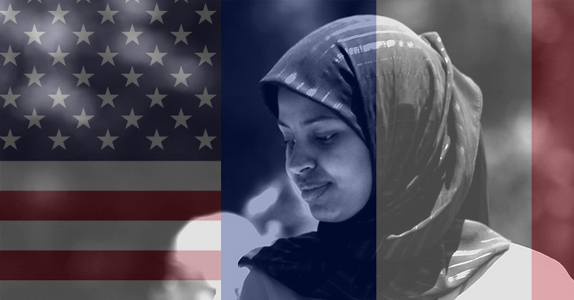
Our taxi comes to a sudden halt and the driver slumps forward, muttering to himself. I’m in the passenger side and, as the only Spanish speaker, try to get him to tell me what is wrong.
“I’m having a nervous breakdown,” he finally says. “We can’t go any farther.”
We’re in the El Raval district of Barcelona, Spain and headed to a very well-known restaurant for dinner, my wife and I who were living there at the time and two friends from Colorado. The driver finally says that because there are Moroccans living in El Raval, it’s too dangerous for him. At first I’m astonished but then I realize how often I’ve heard this story of how immigrants, Moroccans in the case of Spain and Algerians in the case of France, are always dangerous, always the cause of all the crimes and all the ills of society.
We get out of the cab, walk the rest of the way to the restaurant, have a wonderful meal and no problems.
With the terrible killings in Paris, attention has finally turned to the thousands of North Africans who have not been assimilated into those societies, live separate lives, and do not feel that they are a part of the future of those countries. We saw it repeatedly in both Spain and France.
Visit, for example, the beautiful open air market in Arles. The upper section is all run by French vendors, the lower section Algerian/French, a section where you can feel the tension.
Or take the Basilique Saint-Sernin in Toulouse, the largest Romanesque church in Europe, built between 1080 and 1120 AD. When we went to visit, there was a huge Algerian flea market all around it. We felt so uncomfortable there that I stayed in the car to guard it instead of going into the church myself.
Gypsies are in the same category. For example, in late May every year, there is a huge gypsy festival in the tiny French coastal town of Les Saintes Maries de la Mer near the mouth of the Rhone River. I’ve taken many pictures of the gypsies who come from all over France and Europe and always offer to send them prints. Most of them would look blankly at me. They had no fixed addresses so how could I send them a photo? Those French gypsies lived nomadic lives, using their housing subsidies to buy the vans they lived in. Few went to school, many couldn’t read or write. They lived apart, partially because of discrimination, partially because that was what they wanted.
Europeans will talk about discrimination in the United States. This is understandable because our issues are open and public, always making the headlines. In France and Spain, however, the problem is much worse because it is hidden – or at least has been hidden until now. Outsiders, whether they have come from Algeria or Morocco or are gypsies, are simply forgotten. Until now, there has been no discussion about assimilation, no questioning of the fact that large parts of the populations of those countries are simply not part of French or Spanish society. For example, the idea that a Moroccan or other minority who has become a Spanish citizen and lives in Barcelona could rise up through the political ranks is simply preposterous. In fact, even people who have migrated there from other parts of Spain are marginalized. Many Spaniards regret this; that’s why there was such excitement over the first election of Barack Obama. I was in Spain in February, 2008, three weeks before Spain’s national elections and when I asked people about politics, they would immediately start talking about Obama. They were far more interested in his potential election nine months later than their own national elections in three weeks. However, the fact that they admired what we were doing had no impact on how minorities would be treated there. As I wrote recently, the many Catalans who want to be independent from Spain don’t just reject Moroccans; they’re rejecting even other Spaniards.
Now we have to rally with the French and unite in this fight against terrorism. That’s why it was a huge mistake for Obama to have missed the rally in Paris on January 11.
At the same time, there are things we could be doing here to avoid this process of estrangement or lack of assimilation.
First, get rid of the contemptuous attitude many Americans have towards Mexico and Mexicans.
Second, deal with the issue of income inequality which is leading many Americans to feel that they no longer have a stake in our country or an opportunity to reach their full potential.
Third, find ways in which people can serve. Today, only a tiny percent of our youth serve in the military and many fewer in entities like the Peace Corps. For all our flaws, this is still the best place in the world to live. To a large extent, that is due to the many Americans who do perform some form of service whether it’s in the military, working at a soup kitchen, volunteering in a school, serving in the Peace Corps or helping with environmental issues. For example, I’ve come to know many New Mexicans who perform important humanitarian work along the Mexican border. These are heroic people and more of us should be following their example.
(Image of woman in hijab by Ben Pollard / CC)

January 24, 2015